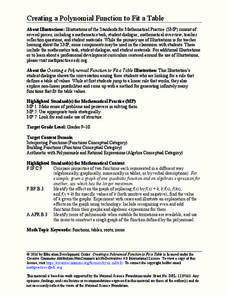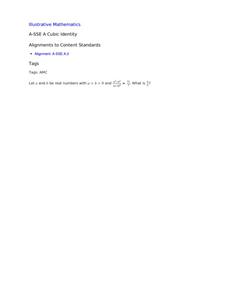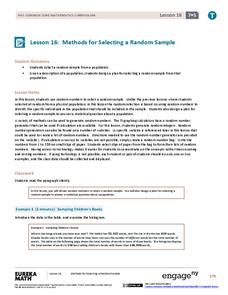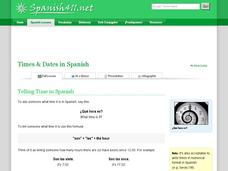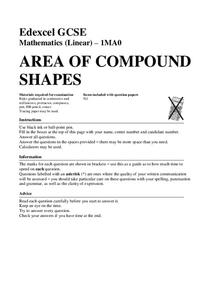Education Development Center
Creating a Polynomial Function to Fit a Table
Discover relationships between linear and nonlinear functions. Initially, a set of data seems linear, but upon further exploration, pupils realize the data can model an infinite number of functions. Scholars use multiple representations...
EngageNY
Displaying a Data Distribution
Pupils analyze a display of data and review dot plots to make general observations about the highest, lowest, common, and the center of the data. To finish, learners match dot plots to scenarios.
Illustrative Mathematics
An Integer Identity
Challenge algebra learners to use the difference of cubes to solve this problem. Once your charges have taken out the factor (a - b), combined the like terms and set them equal to zero, the problem becomes a factorable quadratic...
Charleston School District
Evaluation of Roots
You mean the square root of five and five don't have the same value? Learners estimate the value of irrational roots. As they practice estimating the value, they increase their understanding of roots. The lesson is the fourth in a series...
EngageNY
Methods for Selecting a Random Sample
Random sampling is as easy as choosing numbers. Teams use random numbers to create a sample of book lengths from a population of 150 books. The groups continue by developing a technique to create samples to compare from two populations...
Novelinks
Zach’s Lie: Magic Squares
Individuals match vocabulary words within a magic square, a concept that ties in nicely with math class. The words are all located in Zach's Lie and were specifically selected to increase comprehension of the text. Fifth in a series...
Prestwick House
The Orphan Train
What do a girl in foster care and a 91-year-old widow have in common? A crossword puzzle related to Orphan Train highlights some of the similarities the two characters share in the book. The puzzle pulls out key details from the novel to...
Curated OER
Times & Dates in Spanish
Use this information, presentation, and infographic to build several lessons on telling the time and expressing the date in Spanish. The information is broken into topics and includes many examples and exceptions to the standard rules....
Fluence Learning
Writing About Informational Text: Political Parties
To demonstrate their ability to craft an analysis of informational text, class members read excerpts from James Madison's "The Federalist No. 10," from George Washington's Farewell Address, and from Thomas Jefferson's First Inaugural...
Mr. Nussbaum
Thomas Jefferson Reading Comprehension
Discover a little bit about Thomas Jefferson in a brief reading passage. Learners then answer a set of multiple choice comprehension questions.
Grammar Net
Adjectives of Comparison
Is our car bigger than theirs? Is this car better than than that one? Use comparative and superlative adjectives of provided verbs to complete twenty sentences.
Curated OER
Hanukkah - ESL
Reinforce vocabulary and reading comprehension with a Hanukkah-themed collection of worksheets. Scholars first read a two-paragraph informational text, then apply their new-found-knowledge to match phrases, fill in blanks with...
Prestwick House
Of Mice and Men
What is Lennie Small's dream job? What's the future George imagines? Readers of Of Mice and Men must identify character and events from John Steinbeck's novella about the friendship of two California migrant workers.
CCSS Math Activities
Satellite
This isn't rocket science, you know. A performance task has learners use right triangle trigonometry to calculate distances from stations on Earth to a satellite. It also requires finding the distance between two stations along the...
University of Texas
The Origin of Bone Names
The rib bone's connected to the xiphiod! But, what two Greek words are related to xiphiod? And what do certain Latin terms mean? Build understanding of the bones in the human body as well as Latin and Greek vocabulary with a scavenger...
Learner
Solid Shapes
A collection of two lessons, kindergartners will identify two-dimensional shapes in solid shapes. They will develop basic knowledge of the components that make up a sphere, rectangular prism, pyramid, cylinder, cone, and cube. Young...
Curriculum Corner
Find the Factors
Challenge mathematicians to show what they know with a worksheet all about factoring. Scholars factor seven given numbers to identify which of the variety of choices does not belong.
Mathed Up!
Area of Compound Shapes
Scholars learn how to determine the area of compound shapes by finding the areas of the basic shapes that make it up. Pupils find the areas by adding areas together or subtracting them.
Ed Worksheets
Read the Story
Want to boost your readers' comprehension skills and strategies? Look to these five pages, each with a short story and questions to answer covering main idea, facts, sequence of events, context clues, conclusions, and making...
Worksheet Web
Learning About Rate
After reading a one-page passage on how to understand and solve distance/rate problems, young mathematicians answer six word problems that have them correctly set up the formula in order to solve for the distnace, rate, or time in the...
Math Worksheets 4 Kids
Percent into Decimal
Young business entrepreneurs will need to know how to calculate interest rates before making millions. Empower their knowledge with a instructional activity on converting percents into decimals.
Mathematics Assessment Project
A Million Dollars
Could you carry a million dollars in $1 bills? As a middle school assessment task, learners investigate different questions regarding a million dollars. They then determine how long it would take to make a million dollars, how...
Shmoop
Functions Worksheet 5
To the point and deeper thinking are both types of questions included in the worksheet. Begin the practice of solving quadratics and then finish with five questions asking quadratic and exponential application problems.
Have Fun Teaching
When Am I? (16)
How can you tell when a story takes place? Use context clues to infer the time of day and seasons of five short reading passages. Kids then note each passage's time period as daytime or nighttime, as well as winter or summer.
